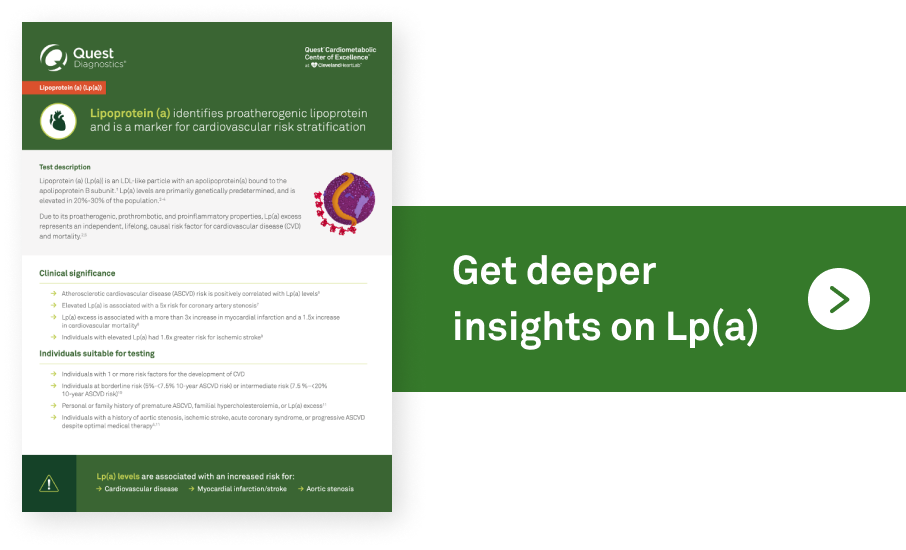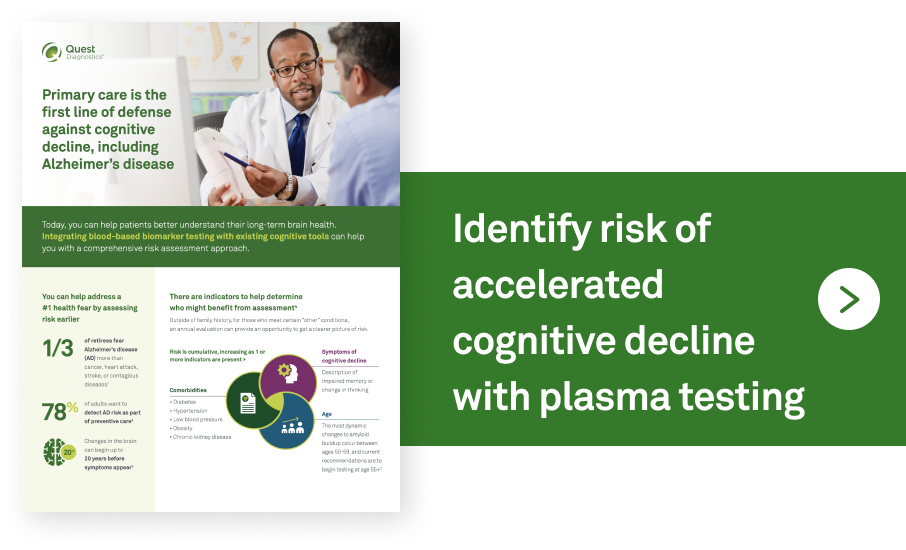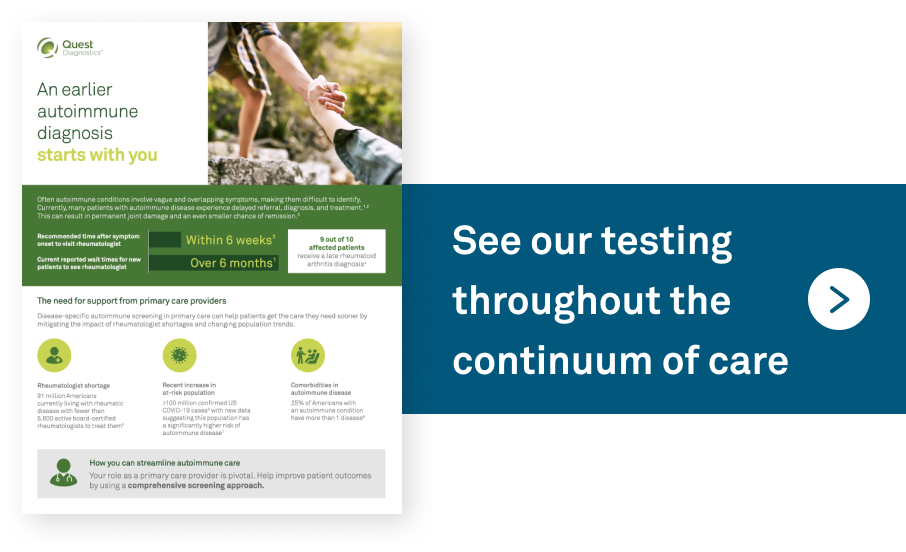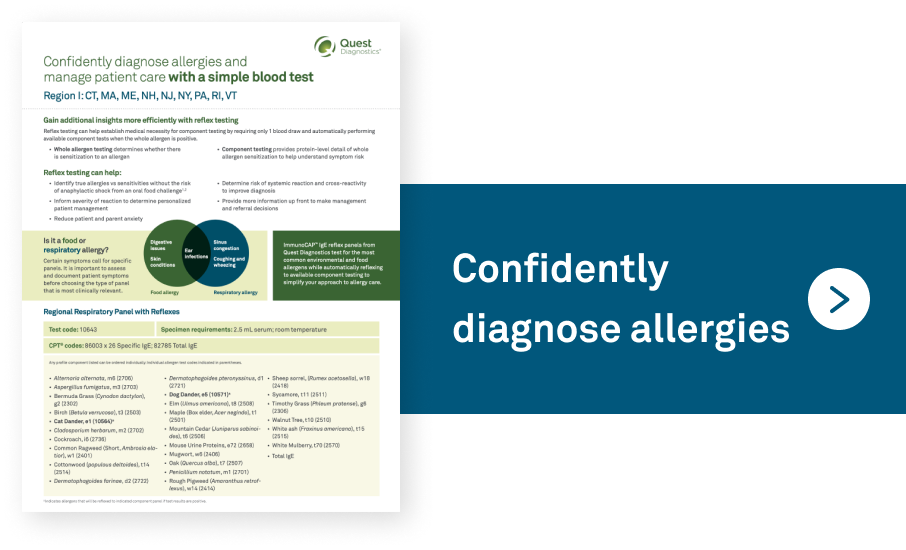August 2024

Discoveries, trends, and discussions in diagnostics
1) International Overdose Awareness Day
2) Lipoprotein (a) is catching headlines for helping to assess risk for cardiovascular disease
4) Expansive autoimmune testing and reliable insights to help end the diagnosis waiting game
5) Reflex testing: Additional allergy insights with only 1 blood draw
6) Quanum® Lab Services Manager—a digital experience that makes it easier to work with us
|
|
International Overdose Awareness Day |
|
|
International Overdose Awareness Day |
|
|
International Overdose Awareness Day |
International Overdose Awareness Day |
Together, we can help protect patients who may be at risk
The drug-related overdose epidemic is deadlier than ever with drug overdose deaths topping 107K in 2022.1 August 31 is International Overdose Awareness Day, and we strongly support the global effort to raise awareness of overdoses and protect those at risk.
Clinical drug monitoring is a critical tool to help combat the evolving drug misuse epidemic, and we are at the forefront with an extensive test menu, state-of-the-art technologies, fast turnaround time, easy-to-interpret results, and dozens of toxicology and other clinical specialists available to help you.
Monitoring patients for medication adherence can help
|
|
Identify prescribed and nonprescribed substances |
|
|
Prevent harmful drug interactions |
|
|
Assist in the early detection and prevention of substance use disorder |


|
Better outcomes |
Better outcomes |
Lipoprotein (a) is catching headlines for helping to assess risk for cardiovascular disease




Blood-based risk assessment offerings can help enhance the Alzheimer’s disease and dementia care pathway

|
Better experiences |
Better experiences |
Expansive autoimmune testing and reliable insights to help end the diagnosis waiting game
Reflex testing: Additional allergy insights with only 1 blood draw
- Whole allergen testing determines whether there is sensitization to an allergen
- Component testing provides protein-level detail of whole allergen sensitization to help understand symptom risk

|
Removing traditional barriers to testing |

|
Removing traditional barriers to testing |
Removing traditional barriers to testing |
Quanum® Lab Services Manager—a digital experience that makes it easier to work with us
Achieving the Quadruple Aim in your practice
About Diagnostics Dialogue
- American Medical Association. Overdose epidemic report 2023. 2023. Accessed June 12, 2024. https://www.ama-assn.org/system/files/ama-overdose-epidemic-report.pdf
- Tsimikas S, Fazio S, Ferdinand KC, et al. NHLBI Working Group recommendations to reduce lipoprotein(a)-mediated risk of cardiovascular disease and aortic stenosis. J Am Coll Cardiol. 2018;71(2):177-192. doi:10.1016/j.jacc.2017.11.014
- Schmidt K, Noureen A, Kronenberg F, Utermann G. Structure, function, and genetics of lipoprotein (a). J Lipid Res. 2016;57(8):1339-1359. doi:10.1194/jlr.R067314
- Mack S, Coassin S, Rueedi R, et al. A genome-wide association meta-analysis on lipoprotein(a) concentrations adjusted for apolipoprotein(a) isoforms. J Lipid Res. 2017;58(9):1834-1844. doi:10.1194/jlr.M076232
- Kamstrup PR, Tybjaerg-Hansen A, Steffensen R, Nordestgaard BG. Genetically elevated lipoprotein(a) and increased risk of myocardial infarction. JAMA. 2009;301(22):2331–2339. doi:10.1001/jama.2009.801
- Langsted A, Nordestgaard BG, Kamstrup PR. Elevated lipoprotein(a) and risk of ischemic stroke. J Am Coll Cardiol. 2019;74(1):54-66. doi:10.1016/j.jacc.2019.03.524
- Hampel H, Hu Y, Cummings J, et al. Blood-based biomarkers for Alzheimer’s disease: Current state and future use in a transformed global healthcare landscape. Neuron. 2023;111(18):2781-2799. doi:10.1016/j.neuron.2023.05.017
- Janelidze S, Palmqvist S, Leuzy A, et al. Detecting amyloid positivity in early Alzheimer’s disease using combinations of plasma Aβ42/Aβ40 and p-tau. Alzheimers Dement. 2022;18(2):283-293.doi:10.1002/alz.123957
- Autoimmune Association. Tips for getting a diagnosis of an autoimmune disease. Accessed May 2, 2024. https://autoimmune.org/resource-center/diagnosis-tips/
- CDC. Diagnosed allergic conditions in children aged 0–17 years: US, 2021. January 2023. Accessed June 18, 2024. https://www.cdc.gov/nchs/products/databriefs/db459.htm






